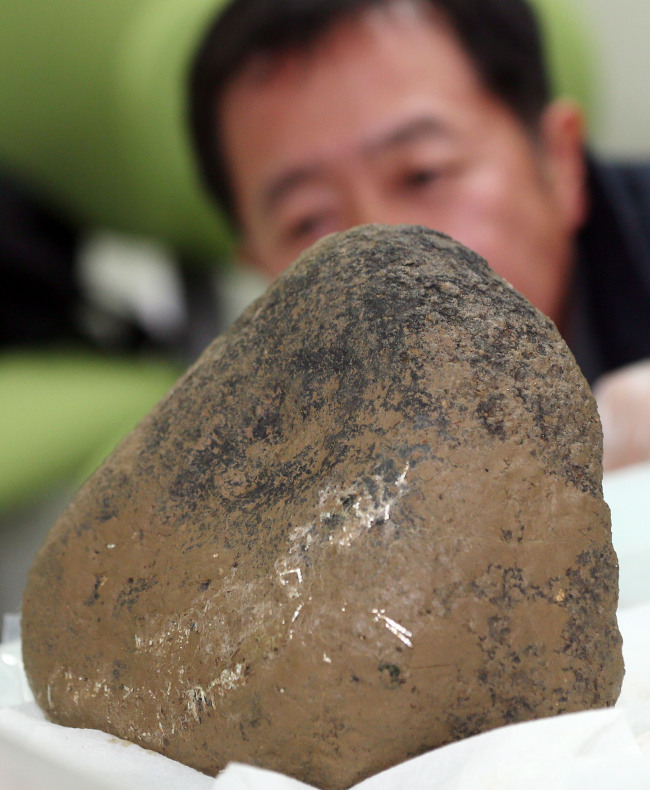Interest is growing in the two mysterious black rocks found at Korean farms, with early analysis results indicating that at least one may be a meteorite.
On Wednesday, a second rock suspected of being a meteorite was found in Jinju, South Gyeongsang Province.
The owner of the farm where the new rock was found, located 4 kilometers from the farm where a suspected meteorite was found on Monday, has requested that it be analyzed.
If scientists confirm that the stones are meteorites, they will become the fifth and sixth found in Korea. Previous finds were recorded in 1924, 1930, 1938 and 1943.
 |
This mysterious rock found in Jinju, South Gyeongsang Province, Monday is thought to be a meteorite. (Yonhap) |
The rock found on Monday, weighing 9.36 kilograms, has been analyzed and initial findings show it could be the largest meteorite found in the country so far, pointing to its high concentration of iron.
“Its burnt surface and 5-6 percent iron concentration are indications of a meteorite,” said Lee Jong-ik, a geology director at the Korea Polar Research Institute.
The Institute said it would conduct an extensive examination of the rock over the next two weeks to determine whether it had fallen from space.
If the rock is found to be a meteorite, officials say they will report it to an international meteorite association. The person who found it will be the owner of the rock and has the right to name it.
The rock ― 18 centimeters wide, 14 centimeters long and 12 centimeters high ― sparked online debate about its scientific and monetary value.
Lee of the KPRI said the price of a meteorite varied depending on the type, but said “usually, a common type costs $5 per gram.”
Based on Lee’s calculation, the presumed meteorite’s worth is estimated at about 50 million won ($47,000).
But some experts suggest the value could be higher.
If it is confirmed a meteorite, the price of the rock could range from 1 billion won to 5 billion won, according to reports that quoted comments from other experts.
“Finding a meteorite in Korea is extremely rare. The price can go significantly higher after analyzing the size, type, age, features and where it is from,” said Kim Kyung-soo, head of Chinju National University of Education’s geoscience institute.
In February last year, a meteorite weighing 600 kilograms was found in a lake in Russia. The Russian government purchased it to make medals for the Sochi Olympics. It cost about $1.3 billion, about 40 times more than the price of the same amount of gold.
By Suk Gee-hyun (
monicasuk@heraldcorp.com)






![[Herald Interview] 'Trump will use tariffs as first line of defense for American manufacturing'](http://res.heraldm.com/phpwas/restmb_idxmake.php?idx=644&simg=/content/image/2024/11/26/20241126050017_0.jpg)
![[Exclusive] Hyundai Mobis eyes closer ties with BYD](http://res.heraldm.com/phpwas/restmb_idxmake.php?idx=644&simg=/content/image/2024/11/25/20241125050044_0.jpg)
![[Herald Review] 'Gangnam B-Side' combines social realism with masterful suspense, performance](http://res.heraldm.com/phpwas/restmb_idxmake.php?idx=644&simg=/content/image/2024/11/25/20241125050072_0.jpg)